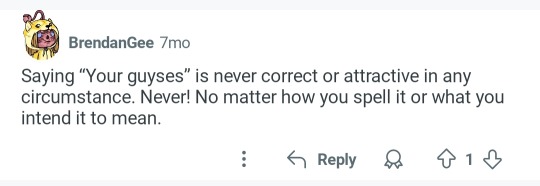#language //
Explore tagged Tumblr posts
Text
was doing research to craft a thoughtful and informed response to this post but instead came across this reddit comment

"y'all's" is the best regional solution to the english second person plural possessive problem but "your guyses" is my favorite because it sucks
43K notes
·
View notes
Text
We ask your questions anonymously so you don’t have to! Submissions are open on the 1st and 15th of the month.
#polls#incognito polls#anonymous#tumblr polls#tumblr users#questions#polls about language#submitted may 15#polls about etiquette#polls about ethics#polls about interests#language#music#songs
114 notes
·
View notes
Text
Cómo distinguir idiomas asiáticos:
75 notes
·
View notes
Quote
Words are like wind and waves; actions are a matter of gain and loss. Wind and waves are easily moved; questions of gain and loss easily lead to danger.
Zhuangzi, The Complete Works of Zhuangzi, Watson tr. (Ch 4)
50 notes
·
View notes
Photo

How Certain Yiddish Words Became Incorporated Into Everyday English
30 notes
·
View notes
Text

That is a highly specific use of a word


13K notes
·
View notes
Text

Little big viola
The word cello is a so-called clipping of violoncello. This Italian word has a funny literal meaning: 'little big viola'. That's because it's a double derivative of viola, an alto stringed instrument. It was derived like this: viola > violone ('big viola') > violoncello ('little big viola'). In Italian, -cello is nothing more than a suffix, so what remained in the English clipped form cello is only the part meaning 'small' - that is, if you look at it etymologically. My new infographic tells you more about the violin family, of which the word fiddle is an uncertain member.
#historical linguistics#linguistics#language#etymology#english#latin#dutch#lingblr#german#italian#franco-provençal
28 notes
·
View notes
Note
Thought I'd ask what the consonant glyphs are for /gh/ and /lj/ in Valyrian writing.
There aren’t any.
21 notes
·
View notes
Quote
日本語にすると「I got it.」と同じく「分かりました。」という意味ではありますが、「I got it.」の場合が「分かりました。あなたの言ったことを理解しました。」という意味のみであるのに対し、「You got it.」の場合は「仰せの通りに」という意味に近く、「了解しました。あなたの指示通りにしますよ。(あなたは求めていることを確かに得たという意味で)」使います。 「I got it.」だと、大きな声で言うと「分かったよ!」「分かってるよ!」とキレ気味に聞こえるかもしれないような場合もあるので、「You got it.」の方がより相手本位で素直に従うような言い方になると思います。
(24) 英語の「I got it.」と「You got it.」の違いは何でしょうか?に対するMitsuya Hiromasaさんの回答 - Quora
20 notes
·
View notes
Text
also "not my cup of tea"
and adding very sincere "but good for you" <3
i like the phrases "it's not for me," "it's not my thing," and "i'm not the target audience" because they're the most concise way to express "this thing that you enjoy has merits but idgaf about it" without being aggressive
14K notes
·
View notes
Text
The English word brother and the French word frère have cognates in Greek φράτηρ (phrátēr) and Sanskrit bhrā́tṛ. But Greek and Sanskrit also have other words meaning 'brother', respectively ἀδελφός (adelphós) and ságarbhya, which don't have cognates in English and French. This seems extremely unfair, and I propose we rectify this oversight immediately.
Adelphós and ságarbhya come from Indo-European *sm̥-gʷelbʰ-ós (actually ságarbhya must come from the o-grade, and with a different suffix, but I don't care). This should produce singulbus in Latin, which would become French sangouf. Meanwhile, PIE *sm̥-gʷelbʰ-ós would become *sunkilbaz in Proto-Germanic, syncilf in Old English, and therefore I believe sinchel in modern English.
Who's with me? Liberté, égalité, sangoufté!
16 notes
·
View notes
Text
jury-rigged. even keel. by the board. three sheets to the wind. loose cannon. son of a gun. pipe down. taken aback.

47K notes
·
View notes
Text
Alien: my name is Hugh
French human: damnit

63K notes
·
View notes
Text

common origins of suffering, euphoria, and ferret
substack
#etymology#words#terms#language#vocabulary#chart#diagram#substack#auffering#english#latin#greek#ferret
23K notes
·
View notes
Text
People who try to copy historical writing styles don't say enough weird stuff in them. I'm listening to a 1909 story about a ghost car right now, and the narrator just said he honked the car horn a bunch of times, but the way he phrased it was "I wrought a wild concerto on the hooter".
43K notes
·
View notes